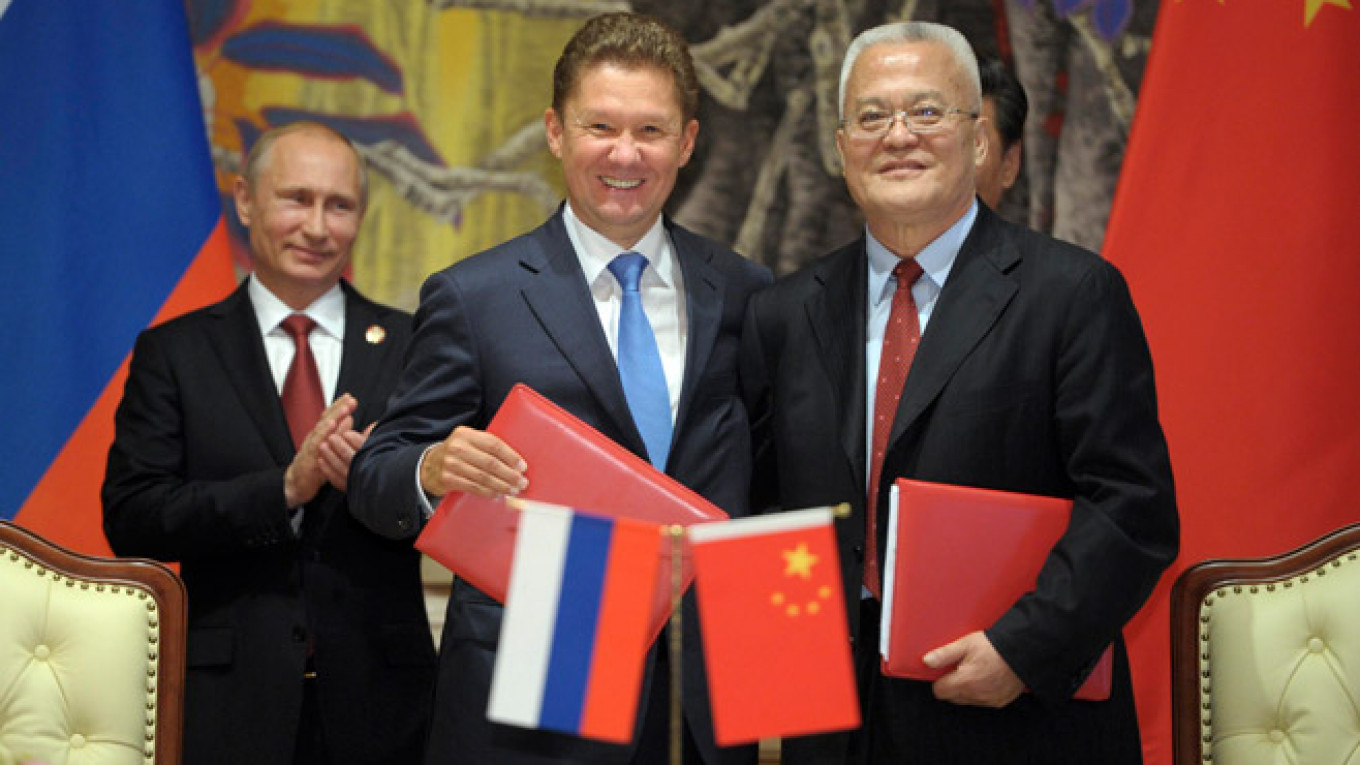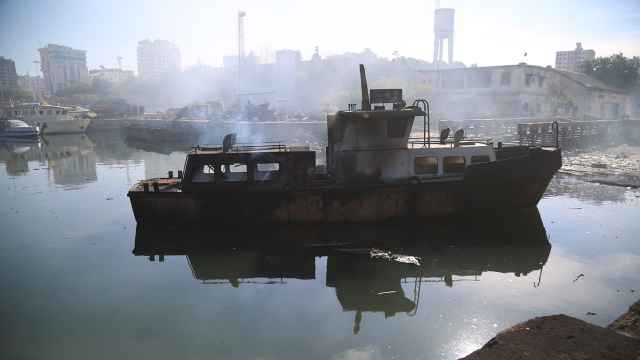The keenly priced gas deal signed this week between Russia and China will create a new price benchmark for global markets that puts cost pressure on other producers because consumers have a growing number of supply sources to choose from.
China and Russia signed a long-awaited $400 billion gas supply deal this week, providing energy-hungry China with a major source of fuel and opening up a new market for Moscow as it risks losing European customers over the Ukraine crisis.
Russia's state-controlled Gazprom has so far declined to say at what price the deal was struck, but industry sources say it is between $350 to $380 per thousand cubic meters.
That would be similar to what most European utilities pay under discounted long-term contracts signed in the last two years, and several sources said it is as low as Gazprom could have gone before making a loss.
Fitch Ratings said the deal "sets a new benchmark for what China is willing to pay for natural gas over longer term contracts."
The deal also opens up a huge new market for Gazprom, which so far generates around 80 percent of its revenues from Europe, where demand is stagnating and profits are falling.
"With European gas demand growth uncertain and the Ukraine crisis leading to calls for Europe to reduce its reliance on Russian gas, Gazprom now needs a 'new Europe' — enter China," said Stephen O'Rourke of energy research and consultancy firm Wood Mackenzie.
A government decision last year to end Gazprom's sole right to export gas has also spurred it to lock in the deal with China, dropping its price closer to levels favored by Beijing.
For China, the price of the deal is crucially below the cost of importing liquefied natural gas, or LNG, from Asia, a fuel on which it increasingly depends.
Increased gas imports will also help Beijing in its declared "war on pollution," aimed at reducing its reliance on coal which contributes to the harmful smog shrouding its big cities.
New Benchmark
The deal between the world's biggest energy exporter and the top importer will have implications far beyond Russia and China, as it effectively creates a new price benchmark.
"With a pipeline deal of this scale, Russia has thrown down the gauntlet to LNG producers courting Chinese buyers," said David Stokes of Timera Energy.
"Russian pipeline exports, which look to be competitively priced versus LNG, are set to have a material impact in eroding Chinese LNG demand. There is likely to be an important knock-on impact on the global LNG supply and demand balance, given the central role China plays in growth projections," he added.
China plans to build 15 new import terminals which, once completed, will catapult it from a relatively small LNG importer into the world's biggest consumer after Japan.
Buyers Market
The deal could cause trouble for other gas exporters, as it is likely to pull down LNG prices and put developers of new gas fields under pressure to cut costs or cancel some projects.
Several new producers are hoping to begin selling gas to Asia soon, including those in Australia, North America, East Africa and the East Mediterranean, but with Russia entering this market in around 2018 at a competitive price, some may struggle.
"China now has a powerful stick with which to beat down LNG prices," said energy analyst Thierry Bros of French bank Societe Generale.
"They can tell their LNG suppliers 'either you bring your price below Russian piped costs or we will install a second line from Russia and cut you out'," he added.
Beyond supplying China with gas via a pipeline, this week's deal also opens up an opportunity for Gazprom to become a bigger player in the booming Asian LNG market, a sector it has so far not been involved in on a major scale.
Gazprom is planning to build up LNG export terminals on the Russian Pacific coast, on the island Sakhalin and near Vladivostok, but so far lacks the infrastructure to supply these projects with the gas necessary to meet demand in Asia.
The pipeline to China would change this, positioning Gazprom close to the leading LNG buyers of Japan and South Korea as well as the rising market on China's eastern coast, and putting it at a geographical advantage over exporters in Africa, Australia and North America.
In Africa, major gas finds off the coasts of Mozambique and Tanzania have triggered hopes that LNG exports will earn billions of dollars for the impoverished region, but analysts now say there may be too many sellers for too few buyers.
"There will be more gas than needed, so those who get to the market first and cheapest will win," said Ebbie Haan, managing director of South Africa's Sasol Petroleum International.
In the East Mediterranean, where Israel and Cyprus have discovered large offshore gas fields, Australia's Woodside Petroleum this week pulled out of an agreement to take a stake worth up to $2.7 billion in Israel's flagship Leviathan gas project.
Woodside is a specialist LNG developer, and the company was targeting sales in Asia with its involvement in Israel.
"After many months of negotiations it is time to acknowledge we will not get there under the current proposal," said Woodside CEO Peter Coleman.
In North America, several LNG export terminals are also beginning to have trouble attracting buyers, and several Australian projects have also been downsized or delayed due to excessive cost.
Uncertainty over future pricing of LNG has led Asian consumers to hold off signing 20-year deals amid expectations that prices will soon enter a period of decline.
As a result, final investment decisions on new projects have come to a virtual standstill, while cost blowouts in Australia are further deterring investors from signing up.
A Message from The Moscow Times:
Dear readers,
We are facing unprecedented challenges. Russia's Prosecutor General's Office has designated The Moscow Times as an "undesirable" organization, criminalizing our work and putting our staff at risk of prosecution. This follows our earlier unjust labeling as a "foreign agent."
These actions are direct attempts to silence independent journalism in Russia. The authorities claim our work "discredits the decisions of the Russian leadership." We see things differently: we strive to provide accurate, unbiased reporting on Russia.
We, the journalists of The Moscow Times, refuse to be silenced. But to continue our work, we need your help.
Your support, no matter how small, makes a world of difference. If you can, please support us monthly starting from just $2. It's quick to set up, and every contribution makes a significant impact.
By supporting The Moscow Times, you're defending open, independent journalism in the face of repression. Thank you for standing with us.
Remind me later.






